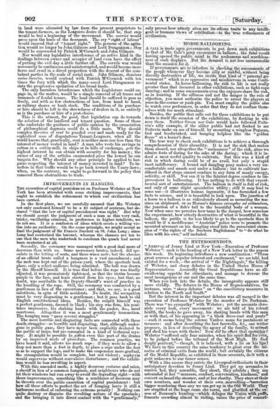IMPROVEMENTS IN liANGING.
THE execution of capital punishment on Professor Webster at New York has been attended with some striking improvements, that ought to establish the refinement to which our civilization has teen carried.
In the first place, we are carefully assured that Mn Webster not only confessed himself to be a tit subject of sentence, but de- clared "that the law of capital punishment was right." But why we should accept the judgment of such a man as this very rash, tricky, vacillating criminal, in preference to higher intellects, we do not see. It is a confusion of ideas which erects a willing vic- tim into an authority. On the same principle, we might accept as final the judgment of Sir Francis Burdett on St. John Long ; since Long had cauterized the baronet, whereas the chances are ten to one that the men who undertook to condemn the quack had never been cauterized at all.
Secondly, the ceremony was managed with a good deal more,of decorum than with us. Some mercenary brutes, indeed, did spe- culate in the letting of seats, and there was a mob ; but the absence of an official brute called a hangman is a vast amendment; and the mob was kept out of theprison-yard, where the spectacle took race, onslbyeraiff iLetseaudience being lf. It is true that before' theeropet was finally 'listed, it was prematurely tightened, so that the victim became purple in the face, and tears started from his eyes ; but that, no doubt, was ascribable to the Deputy-Sheriff's want of practice in the handling of the rope. Still, the ceremony was conducted by a gentleman in lieu of the executioner; and that, we say, is a good substitute, in spite of little accidents. No doubt, the occupation must be very disusting to a gentleman ; but it goes back to old Pziglieli constitutional ideas. Besides, the culprit himself was a perfect gentleman, dressed in black ; his step was firm, his peni- tence impressive, his shaking hands with the gaoler, &c., most courteous. Altogether it was a most gentlemanly transaction. The hanging man "gave several struggles." The most horrible and disgusting facts are connected with these death-struggles—so horrible and disgusting, that, although under- guxie iinblic gaze, they have never been explicitly declared to the public at large, but are concealed in a kind of technired mys- tery. It might be possible to reeften even this part of the drama by an improved mode of procedure. The common practice we have heard it said, allows too much rope : if they were to allow a drop not more than a foot in depth, to place a rope under the feet seas to support the legs, and to make the suspension more gradual, the strangulation would be complete, but not violent ; asphyxia would supervene without convulsive disturbance ; and the eyhihi- tion would be less revolting in aspect.
With this amended mode, a highly decorous costume and mien, a sheriff in lien of a common hangman, and neighbours who do not let their windows but run away to avoid the degrading sight--with these improvements, something like a semblance of decorum may be thrown over the public execution of capital punishment : but how all these efforts to perfect the art of hanging leave it stills barbarous method of enforcing the extreme penalty ! Nothing can quite destroy or disguise the revolting nature of the spectacle; and the bringing it into direct contact with the "gentlemanly,"
only proves-how -utterly alien are its odious traits to any intelli- gent or humane views of retribution—to the true refinements of


























 Previous page
Previous page